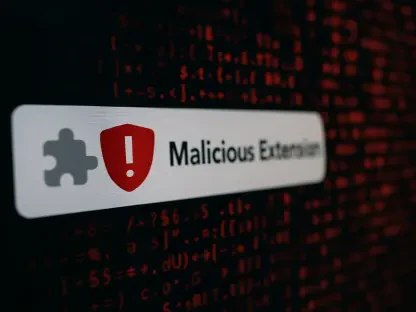The rise of artificial intelligence (AI) has brought significant advancements across various industries, but it has also increased the complexity and frequency of cyber threats. Enterprise Resource Planning (ERP) systems, which are crucial for the seamless operation of large enterprises, are not exempt from this trend. Ransomware attacks, particularly those enhanced by AI, pose a significant risk to the stability and integrity of these critical applications. Examining how ERP systems can withstand these evolving threats is essential for safeguarding business operations.
As highlighted in recent research conducted by Onapsis, the increasing frequency of ransomware attacks on ERP systems is an urgent concern. The study indicates that a staggering 83% of organizations experienced at least one ransomware incident in the past year, with nearly half enduring multiple attacks. The impact of these attacks is significant, often resulting in downtime of at least 24 hours for 61% of affected companies. Given that ERP systems are central to the management of key business processes, these interruptions can lead to substantial financial losses, underscoring the necessity for robust and proactive security measures.
Growing Prevalence of Ransomware Attacks on ERP Systems
Recent research conducted by Onapsis highlights the alarming frequency of ransomware attacks. According to the study, 83% of organizations experienced at least one ransomware incident in the past year, with nearly half experiencing multiple attacks. The impact of these attacks is profound, often causing downtime of at least 24 hours for 61% of affected companies. Given that ERP systems are central to managing key business processes, these interruptions can lead to substantial financial losses.
With the integration of AI into ransomware attacks, the landscape of cyber threats has only become more perilous for ERP systems. AI allows malicious actors to develop more sophisticated and targeted attacks, making traditional security measures less effective. This growing sophistication highlights the urgent need for enterprises to revisit their cybersecurity strategies and ensure they are adequately prepared to defend against AI-enhanced threats. The ability to anticipate and mitigate these advanced attacks is paramount to maintaining the stability and security of ERP systems.
The Inadequacy of Existing Security Measures
A significant finding from the Onapsis study is the reliance on built-in security features of ERP solutions, which often proves insufficient against advanced ransomware attacks. Many enterprises assume that the integrated security measures within their ERP systems are capable of defending against all threats. However, these generic solutions are not tailored to combat the specific vulnerabilities and sophisticated nature of modern ransomware.
The necessity for specialized security measures designed specifically for ERP environments cannot be overstated. These measures need to go beyond traditional defenses and include capabilities such as enhanced monitoring, behavior analysis, and rapid response mechanisms. By focusing on these targeted solutions, enterprises can better protect their ERP systems from sophisticated cyber threats. Without these specialized security measures, ERP systems remain highly susceptible to attacks, putting entire business operations at risk. The stakes are high, and it is imperative for enterprises to recognize and address these vulnerabilities.
The Escalating Threat of AI-Enhanced Ransomware
The integration of AI into ransomware is a growing concern for cybersecurity professionals. AI allows attackers to automate and refine their methods, making it easier to exploit vulnerabilities in ERP systems. This has been identified as a top concern for enterprises, as AI-enhanced attacks are expected to become more prevalent and damaging.
Mariano Nunez, CEO of Onapsis, highlights that the high leverage obtained by targeting ERP systems makes them an attractive target for ransomware actors. The financial and operational disruptions caused by such attacks can be devastating, necessitating proactive measures and the adoption of advanced security frameworks to mitigate these risks. By leveraging AI, attackers can create more complex and unpredictable threats, making it essential for enterprises to adopt security measures that can effectively counter these advanced tactics.
Diverse Responses to Ransomware Incidents
Organizations employ a range of strategies when responding to ransomware attacks. The Onapsis study reveals that 69% of enterprises communicate with threat actors during an attack. However, there is no consensus on the best approach to deal with ransom demands. While 34% of companies always pay the ransom, 21% do so occasionally, and 45% refuse to pay.
Engaging with ransomware brokers has become a common practice among those who choose to pay. These brokers can navigate negotiations and handle ransom payments, theoretically increasing the chances of recovering encrypted data. Nevertheless, paying ransoms is a contentious strategy, as it can encourage further attacks and does not guarantee file recovery. Given the varied responses, it is clear that enterprises need to develop comprehensive strategies and policies for dealing with ransomware attacks, ensuring they are prepared for all possible scenarios.
Investing in Comprehensive Security Overhauls
In response to the pervasiveness of ransomware threats, enterprises are making significant changes to their cybersecurity strategies. The Onapsis study shows that 96% of organizations recognize the need for improvements. Consequently, companies are investing in new security solutions, with 57% adopting advanced technologies to bolster their defenses.
Employee training has also become a priority, with 54% of surveyed organizations focusing on educating their workforce about security best practices. Expanding internal cybersecurity teams (53%) and hiring external threat research teams (36%) reflect a commitment to building a multi-layered defense strategy. These efforts aim to fortify enterprises against a broader range of cyber threats and ensure quicker detection and response times. The importance of a comprehensive and well-rounded approach to cybersecurity cannot be overstated, as it is essential for safeguarding critical ERP systems.
The Imperative for Proactive Measures
The rise of artificial intelligence (AI) has driven significant advancements in numerous industries, yet it has simultaneously amplified the complexity and frequency of cyber threats. Enterprise Resource Planning (ERP) systems, which are vital for the seamless functioning of large organizations, have not been spared. AI-enhanced ransomware attacks, in particular, pose a substantial risk to the stability and security of these essential systems. Therefore, it is crucial to explore how ERP systems can defend against these evolving threats to protect business operations.
According to recent research by Onapsis, the rising occurrences of ransomware attacks on ERP systems are an urgent issue. The study reveals that an alarming 83% of organizations experienced at least one ransomware attack in the past year, with nearly half suffering multiple incidents. The ramifications of these attacks are serious, causing downtime of at least 24 hours for 61% of the affected companies. Since ERP systems are central to managing key business processes, such disruptions can result in significant financial losses, highlighting the critical need for strong and proactive security measures.








